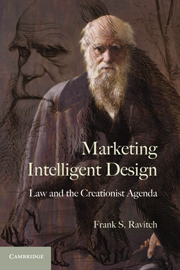Book contents
1 - Designing Design
Published online by Cambridge University Press: 05 June 2012
Summary
Design theory promises to reverse the stifling dominance of the materialist worldview, and to replace it with a science consonant with Christian and theistic convictions.
Concepts concerning God or a supreme being of some sort are manifestly religious.…These concepts do not shed that religiosity merely because they are presented as a philosophy or as a science.
Introduction to Intelligent Design
Every day in public schools, universities, houses of worship, and coffee shops, a battle rages over where humanity came from or, more specifically, how humans came to be human. Much of the debate is focused on whether a supposedly new concept of human origins – intelligent design (ID) – should be taught in public schools. Yet few people know much, if anything, about this concept: how it came to the fore, and what it means for law, science, faith, and the future of America.
ID advocates have a vested interest in this confusion. ID is, at least partially, a response to the success of modern science, especially evolutionary biology and cosmology, in explaining natural phenomena. Yet the form ID has taken is primarily an attempt to respond to several important cases decided by the U.S. Supreme Court and to win in the court of public opinion – not exactly an auspicious baseline for a so-called scientific theory. This book explains that the essence of ID lies in a solid marketing plan and an attempt to avoid legal constraints, not in promoting a serious scientific alternative to evolutionary biology and biochemistry.
Information
- Type
- Chapter
- Information
- Marketing Intelligent DesignLaw and the Creationist Agenda, pp. 1 - 38Publisher: Cambridge University PressPrint publication year: 2010
